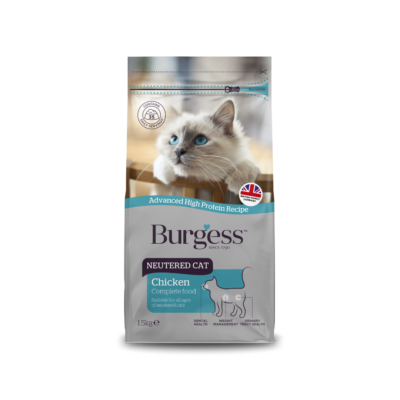
Understanding the moods and whims of our enigmatic cat companions is always a challenge – particularly when they seem to be giving us the cold shoulder and we’re desperate to understand why and be best friends again.
Feline welfare charity International Cat Care explains: “Living with cats can, and should, be a very positive experience with both human and cat benefiting from the relationship. However, occasionally we will encounter a problem or become aware of a situation in our cat’s life that is less than perfect. Cats are adaptable creatures but sometimes a particular lifestyle or social situation will put them under pressure. Cats are ill-equipped to express their concerns openly (it doesn’t pay for a cat to wear its heart on its sleeve) and they internalise their stresses in order to avoid the risk of appearing vulnerable.”
So, if your cat’s being a bit off with you, are they dialling down their affection because they’re holding a grudge, or is there rather more to it?
Cats Protection says: “Despite their sometimes aloof behaviour, cats don’t hold grudges in the same way humans do. The change in behaviour we interpret as a grudge, is often the cat’s natural reaction to a stressful situation. It’s a way of protecting themselves and avoiding a similar situation happening again.”
It’s just my way of handling stress
A case in point is how your cat behaves after a visit to the vet, which many felines find a stressful experience. Cats Protection explains: “When you get home from the vets, your cat might run away and hide for a while, avoiding you for the rest of the day. This can seem like they are holding a grudge against you for putting them through the ordeal of a vet visit. However, it’s actually their natural response to stress. They will hide away until their stress levels reduce.”
Small animal veterinarian Catherine Barnette DVM says: “Although cats demonstrate behaviour that can look like a grudge, their underlying motivations are probably a lot different from how we humans feel when we’re accused of holding a grudge. When we think of a grudge, in a human context, we are referring to someone who harbours long-term feelings of anger or resentment towards someone else. It’s unlikely that this is what is motivating our cats’ behaviours when they give us the cold shoulder.”
Dr Barnette explains that if you tripped over your cat last night and they are avoiding you today then this behaviour is likely to be because your cat wants to avoid being tripped over again, rather than because they’re annoyed with you. She comments: “In a cat, signs of a grudge are more likely to be caused by fear or anxiety than anger or resentment.”
“Cats don’t bear grudges in the same way that we do. Instead, they form associations with negative events,” adds companion animal vet Dr Rebecca MacMillan. “This helps them to try and prevent the same bad thing from happening again. For example, if they accidentally fell down the stairs at home, they may end up avoiding this area for a while for fear of the same thing happening again. It’s a protective mechanism that would have also kept their wild ancestors safe.”
It’s not you, it’s the way I remember things
“Cats are incredibly intelligent, especially about things they don’t like and things that try to cause them harm,” adds Ed Malaker on Catster, a global team of feline lovers whose mission is to help cats live their best lives. “While they might not hate you for putting them in the cage to go to the vet, they will remember that they don’t like the cage, and they will likely run and hide when you bring it out. Cats have complex memories, much like humans, with both long- and short-term memory recall. Their memory helps them form strong bonds with us but also protects them from danger, and it’s their memory of riding in the cage to the vet that will stay with them for life, not that you put them in it.”
“Cats have different types of memory, just as people do,” comments Dr Rebecca MacMillan. She outlines this as working memory, which allows us to make decisions and work problems out; short-term memory, where we can recall information anywhere between a few minutes and a few days; and long-term memory, which is the ability to remember events and information from the past. “This appears to be more of a strength in cats, though there is no conclusive study on how long a cat’s long-term memory lasts. It is thought to be highly variable depending on the cat’s breed, health status, and age.”
So, just like us, cats will remember what went wrong last time and try to avoid it next time. Dr Macmillan adds: “A cat that remembers something bad happening will be keen to avoid it again, making it seem as though your feline friend has a grudge.”
How long your favourite feline will adopt this avoidance behaviour depends on what caused it and your individual cat. “There is no definitive answer as to how long your cat will do this,” says Dr Macmillan. “For many cats, minor misdemeanours seem to fall in the short-term memory category, so it is likely all will be forgiven within a few hours to days.”
HOW DO YOU KNOW IF YOUR CAT IS MAD AT YOU?
Here are some of the things that your cat might do if he or she is feeling cross:
- Your cat hides or leaves the room when you enter it
- They appear tense, stiff, or on high alert
- Their tail is swishing angrily from side to side
- Their ears become flattened against their head
- They arch their back and puff their tail out to make themselves look big
- Hissing or growling at you
- Swiping with their paws
- Lunging or biting
Source: The Vets
How to make friends again
If your cat is avoiding you, it’s only natural to want to ‘make up’, with them, however, the expert advice is to be skilfully subtle rather than showering them with affection.
Dr Barnette suggests: “Avoid the temptation to force affection on your cat. While you may think that a good snuggle would smooth things over, that approach is likely to backfire. Forcing your cat to be held or petted is likely to make the problem even worse! Avoid the temptation to chase your cat around your home or continually call out to your cat (“here, kitty kitty!”). Extra attention is likely to make your cat even more anxious. Instead, remain calm and give your cat space. As time elapses without any stressful interactions, your cat’s comfort around you should eventually return.”
She recommends sitting down several feet away from your cat’s food bowl at mealtimes, to encourage your cat’s approach without actually pursuing them. If your cat has a favourite bed or blanket, moving it next to your usual spot on the sofa can subtly encourage your cat to come close. “If your cat is playful, use toys that will allow your cat to engage from a safe distance, such as a teaser wand,” adds Dr Barnette. “The goal is to encourage your cat to approach you, in a subtle and low-key manner.”
“If your cat has had a stressful experience, it can be tempting to make a big fuss of them as you try to beg for their forgiveness. However, this could just make them more stressed,” advises Cats Protection. “Leave them alone and wait for them to come to you when they are ready for some attention. You could then try offering them a small treat, their favourite toy or a gentle fuss to regain their trust.”
Ed Malaker on Catster adds: “Patience, positive reinforcement, and creating a calm environment are essential to helping a cat feel more at ease. Providing treats and engaging in interactive play can help rebuild trust and improve the relationship. Cats may not ‘forget’ in the way humans do, but they can learn to forgive and move past negative experiences. Building positive associations and consistently providing a secure and enriching environment contribute to a cat’s ability to forgive.”
Dr Macmillan suggests trying these techniques to gently woo your favourite feline into becoming your trusted best friend again:
- Don’t invade their personal space – don’t try and force them to like you by picking them up or fussing them if they don’t want it. This will only make them feel more cross.
- Sit quietly in the same room as them – let them approach you. You can encourage this by placing some of their favourite toys or bedding near to you.
- Prepare their dinner – if it’s clear they’re feeling grumpy at you in particular then be the one to feed them. Prepare their favourite meal and then stay in the vicinity, but again give your cat some space.
- Try gently calling and talking to your cat – if they’re responsive then try and engage them in some play with a favourite toy or treats
She adds: “If your cat continues to seem generally out of sorts, then you may need to seek professional help. Get them checked by a vet to make sure there are no underlying health reasons as to why they are feeling a bit grumpy.”
EVERY CAT DESERVES A DELICIOUS, NUTRITIOUS DINNER. At Burgess Pet Care, all our cat food is made using premium ingredients, locally sourced wherever possible to support British farmers, to ensure excellent quality and superior taste to help keep your cat happy and healthy – from kitten, to adult and mature and our award-winning variety for neutered cats.
Our cat diet and nutrition guide is here to help you create a meal plan that's tailored especially for your feline friend!
HOW OFTEN SHOULD YOU FEED YOUR CAT? Find out why little and often suits most cats – and the reason why play should be part of your feeding routine…
Is your cat a Burgess cat? Join the Burgess Pet Club for exclusive offers and rewards.
If you found this interesting, you may also like:
THE CAT COMMUNICATION GUIDE From purrs to scent signals, body postures and blinking, yowls to growls – cats communicate in a variety of ways. They’ve even developed a way of communicating just with humans – cats don’t bother to meow to other cats, just us! Solve the mysteries of cat communication with our guide.
ARE YOU AND YOUR CAT MORE ALIKE THAN YOU THINK? If you have a grumpy Tabby cat, a super friendly Ragdoll cat, or fiendishly feisty Bengal cat, could this actually say more about you than your pet?
HOW TO TELL IF YOUR CAT REALLY LOVES YOU While you may adore your captivating cat, how does your enigmatic feline companion feel about you?
MY CAT IGNORES ME – WHY Unlike dogs, who generally want to be involved in every situation, cats are known for being independent. While some cats can be quite social, it can be hard to take when your favourite feline seems to take absolutely no notice of you. So why is this the case?
WHY DO CATS LIKE TO SQUEEZE THEMSELVES INTO SMALL SPACES? “If I fits, I sits,” has become a catchphrase and search term for cat fans entranced by felines who have an uncanny ability to squeeze themselves into unfeasibly small spaces. But why do they do it?
WHY CATS LIKE THE HIGH LIFE Is your cat a climber? Does your favourite feline always find a way to scale wardrobes, bookcases and even your curtains? Have you ever wondered why cats like to perch in high places?
GIVE YOUR FUSSY FELINE A CHOICE If you have a feline with discerning taste who can be a little on the fussy side when it comes to dinner time, perhaps it’s time to change things up a little...
CAT BREEDS – TAKE A CLOSER LOOK AT SOME OF THE UK’S MOST POPULAR TYPES OF CAT Siamese or Bengal? Norwegian Forest or Maine Coon? Ragdoll or Russian Blue? Which breed of cat do you find most captivating? We count down 10 cat breeds that are riding high in the popularity charts, plus one favourite feline that’s not actually a breed at all …
PLAY BEHAVIOUR OF CATS SURPRISES SCIENTISTS While there are lots of things that cats do which cause scientists plenty of head-scratching moments, new research into the way cats play has resulted in some rather baffled boffins...
STRANGER DANGER! Does your cat do a disappearing act when visitors appear? Unfamiliar humans entering their territory can send them running for cover. So why is this the case?
BEST FELINE FRIENDS FOREVER? For cats, their territory (your home and the surrounding environs) is everything and the arrival of a new feline will be viewed with the utmost suspicion. While humans may think their solo feline will enjoy the company of playmate, your cat is likely to have other ideas.
GIRLS V BOYS – FELINE MYTHS AND MISCONCEPTIONS Do male and female cats act differently because of their gender? Are generalisations about laid back, lap-loving boys and aloof, independent girls simply myths – or is there any truth to them?
CAN YOU TRAIN A CAT? Felines excel at training their human guardians to give them food, attention and a cosy lap to curl up on. But is it possible for us to train them?
DOES YOUR CAT KNOW THEIR NAME? Whatever name we choose to bestow upon our beloved pet cats, does it make any difference to them? Do they actually understand that they’re called Alfie or Bella or even Archibald von Snugglemuffin?
THE HOMING INSTINCT – CAN CATS REALLY FIND THEIR WAY HOME? Top tip – it’s much easier if they’re microchipped! Plus, what a change in the law will mean for every cat owner…

















